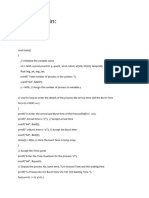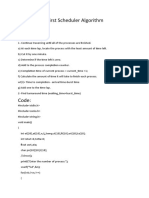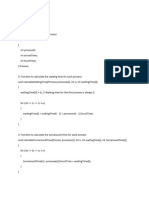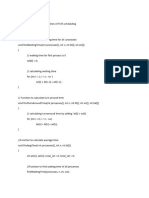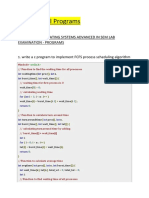Lab Cpu Scheduling Algorithms
Uploaded by
adithyashivan2005Lab Cpu Scheduling Algorithms
Uploaded by
adithyashivan2005Priority scheduling program
#include <stdio.h>
struct Process {
int id;
int burstTime;
int priority;
int waitingTime;
int turnAroundTime;
};
void calculateWaitingTime(struct Process proc[], int n) {
proc[0].waitingTime = 0;
for (int i = 1; i < n; i++) {
proc[i].waitingTime = proc[i - 1].waitingTime + proc[i - 1].burstTime;
}
}
void calculateTurnAroundTime(struct Process proc[], int n) {
for (int i = 0; i < n; i++) {
proc[i].turnAroundTime = proc[i].waitingTime + proc[i].burstTime;
}
}
void sortProcessesByPriority(struct Process proc[], int n) {
for (int i = 0; i < n - 1; i++) {
for (int j = i + 1; j < n; j++) {
if (proc[i].priority > proc[j].priority) {
struct Process temp = proc[i];
proc[i] = proc[j];
proc[j] = temp;
}
}
}
}
void printProcesses(struct Process proc[], int n) {
printf("\nProcess ID\tBurst Time\tPriority\tWaiting Time\tTurnaround
Time\n");
for (int i = 0; i < n; i++) {
printf("%d\t\t%d\t\t%d\t\t%d\t\t%d\n",
proc[i].id, proc[i].burstTime, proc[i].priority, proc[i].waitingTime,
proc[i].turnAroundTime);
}
}
int main() {
int n;
printf("Enter the number of processes: ");
scanf("%d", &n);
struct Process proc[n];
for (int i = 0; i < n; i++) {
printf("\nEnter details for Process %d:\n", i + 1);
proc[i].id = i + 1;
printf("Burst Time: ");
scanf("%d", &proc[i].burstTime);
printf("Priority: ");
scanf("%d", &proc[i].priority);
}
sortProcessesByPriority(proc, n);
calculateWaitingTime(proc, n);
calculateTurnAroundTime(proc, n);
printProcesses(proc, n);
return 0;
}
Output : Enter the number of processes: 3
Enter details for Process 1:
Burst Time: 10
Priority: 2
Enter details for Process 2:
Burst Time: 5
Priority: 1
Enter details for Process 3:
Burst Time: 8
Priority: 3
Process ID Burst Time Priority Waiting Time Turnaround Time
2 5 1 0 5
1 10 2 5 15
3 8 3 15 23
Round Robin scheduling algorithm
#include <stdio.h>
void findWaitingTime(int processes[], int n, int bt[], int wt[], int quantum) {
int rem_bt[n];
for (int i = 0; i < n; i++) {
rem_bt[i] = bt[i];
}
int t = 0; // Current time
while (1) {
int done = 1;
for (int i = 0; i < n; i++) {
if (rem_bt[i] > 0) {
done = 0; // At least one process is remaining
if (rem_bt[i] > quantum) {
t += quantum;
rem_bt[i] -= quantum;
} else {
t += rem_bt[i];
wt[i] = t - bt[i];
rem_bt[i] = 0;
}
}
}
if (done == 1) {
break;
}
}
}
void findTurnAroundTime(int processes[], int n, int bt[], int wt[], int tat[]) {
for (int i = 0; i < n; i++) {
tat[i] = bt[i] + wt[i];
}
}
void findAvgTime(int processes[], int n, int bt[], int quantum) {
int wt[n], tat[n];
findWaitingTime(processes, n, bt, wt, quantum);
findTurnAroundTime(processes, n, bt, wt, tat);
printf("Processes\tBurst Time\tWaiting Time\tTurnaround Time\n");
int total_wt = 0, total_tat = 0;
for (int i = 0; i < n; i++) {
total_wt += wt[i];
total_tat += tat[i];
printf("P%d\t\t%d\t\t%d\t\t%d\n", processes[i], bt[i], wt[i], tat[i]);
}
printf("\nAverage waiting time = %.2f", (float)total_wt / n);
printf("\nAverage turnaround time = %.2f\n", (float)total_tat / n);
}
int main() {
int processes[] = {1, 2, 3};
int n = sizeof(processes) / sizeof(processes[0]);
int burst_time[] = {10, 5, 8};
int quantum = 2;
findAvgTime(processes, n, burst_time, quantum);
return 0;
}
Output:
Processes Burst Time Waiting Time Turnaround Time
P1 10 13 23
P2 5 10 15
P3 8 13 21
Average waiting time = 12.00
Average turnaround time = 19.67
You might also like
- First Come First Serve: Name:N.V.R.RaghavendraNo ratings yetFirst Come First Serve: Name:N.V.R.Raghavendra8 pages
- OS LAB Assignment 1 (Scheduling Algorithms)No ratings yetOS LAB Assignment 1 (Scheduling Algorithms)14 pages
- First Come First Serve (FCFS) : Turn Around Time: The Time Interval Between The Submission of The ProcessNo ratings yetFirst Come First Serve (FCFS) : Turn Around Time: The Time Interval Between The Submission of The Process16 pages
- 4th sem practical exam -2021-(operting system)No ratings yet4th sem practical exam -2021-(operting system)21 pages
- Scheduling Algorithms of Operating SystemNo ratings yetScheduling Algorithms of Operating System7 pages
- End Term_submission Format_DOS(3249) (2)No ratings yetEnd Term_submission Format_DOS(3249) (2)9 pages
- Reading 1 Summary: Is Your Business Ready For A Digital Future?No ratings yetReading 1 Summary: Is Your Business Ready For A Digital Future?2 pages
- High Vacuum Oil Purifier: Kato Electric Mfg. Co., LTD100% (1)High Vacuum Oil Purifier: Kato Electric Mfg. Co., LTD4 pages
- Basic Guitar For Beginners Mag Gitara Tayong LahatNo ratings yetBasic Guitar For Beginners Mag Gitara Tayong Lahat38 pages
- Deep Dive On Modelling in Power BI and SSAS 2016 Kasper de JongeNo ratings yetDeep Dive On Modelling in Power BI and SSAS 2016 Kasper de Jonge71 pages
- How Do I Import An AutoCAD File Into SAP2000 - TheburnNo ratings yetHow Do I Import An AutoCAD File Into SAP2000 - Theburn7 pages
- (Mai 1.4-1.5) Arithmetic Sequences - Solutions100% (1)(Mai 1.4-1.5) Arithmetic Sequences - Solutions6 pages
- File Name Lime-4.0-NA User Manual Version Number V1.0 Release Date 2021/2/24No ratings yetFile Name Lime-4.0-NA User Manual Version Number V1.0 Release Date 2021/2/246 pages
- Needs Analysis For Contextualization Schools 2No ratings yetNeeds Analysis For Contextualization Schools 21 page
- Counters in Digital Electronics - JavatpointNo ratings yetCounters in Digital Electronics - Javatpoint5 pages
- What Is Switchgear?: Quick Links To Fundamentals of Low-Voltage SwitchgearNo ratings yetWhat Is Switchgear?: Quick Links To Fundamentals of Low-Voltage Switchgear29 pages
- Karcher K4400G Parts List and Diagram - (1.133-208.0) - eReplacementPartsNo ratings yetKarcher K4400G Parts List and Diagram - (1.133-208.0) - eReplacementParts31 pages
- Advertisement Policy For Cabinet Approval-II - 28-06-21No ratings yetAdvertisement Policy For Cabinet Approval-II - 28-06-2119 pages
- Method Statement For Installation of Rmu Al Naboodah Mep LLC100% (1)Method Statement For Installation of Rmu Al Naboodah Mep LLC5 pages








